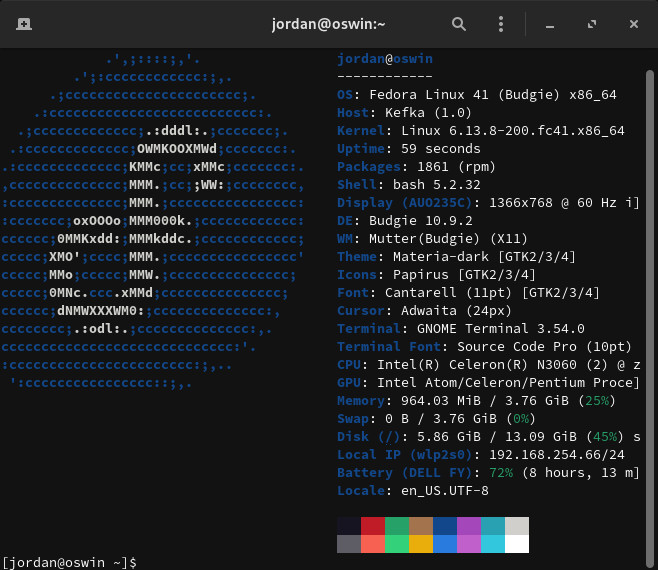Background: I am a lifelong Windows user who is planning to move to Linux in October, once Microsoft drops support for Windows 10. I use a particularly bad laptop (Intel Celeron N3060, 4 GB DDR3 RAM, 64 GB eMMC storage).
I do have some degree of terminal experience in Windows, but I would not count on it. If there are defaults that are sensible enough, I’d appreciate it. I can also configure through mouse-based text editors, as long as there is reliable, concise documentation on that app.
So, here’s what I want in a distro and desktop environment:
- Easy to install, maintain (graphical installation and, preferably, package management too + auto-updating for non-critical applications)
- Lightwight and snappy (around 800 MB idle RAM usage, 10-16 GB storage usage in a base install)
- Secure (using Wayland, granular GUI-based permission control)
I have narrowed down the distributions and desktop environments that seem promising, but want y’all’s opinions on them.
Distributions:
- Linux Mint Xfce: Easy to install, not prone to randomly break (problems: high OOTB storage usage, RAM consumption seems a little too high, kind of outdated packages, not on Wayland yet)
- Fedora: Secure, the main DEs use Wayland (problems: similar to above except for the outdated packages; also hard to install and maintain, from what I have heard)
- antiX Linux (problems: outdated packages, no Wayland)
Desktop Environments:
- Xfce: Lightweight, fast, seems like it’d work how I want (problems: not on Wayland yet, that’s it)
- labwc + other Wayland stuff: Lightweight, fast, secure (problems: likely harder to install, especially since I have no Linux terminal experience, cannot configure through a GUI)
In advance, I thank you all for helping me!
I appreciate any help, especially in things like:
- Neofetch screenshots, to showcase idle RAM usage on some DEs
- Experiences with some distributions
My advice: try them all, then decide. They are all free. Most offer live systems. It will only cost you time, which will be well spent learning.
tl;dr: Break things and have fun.
The other comments do a good job explaining why you would go with X or Y distro based on your requirements. What I want to do is give you a general recommendation/piece of advice based on a feeling I get from reading your post that, that you are not excluding the possibility of tinkering with your system at some point in the future to get it less bloated and more streamlined to your use case (please absolutely correct me if I’m wrong about my interpretation).
As such, I think if your current computer has the ability to reasonably run Mint you should go with that. The reason is that it simply works most of the time without much hassle. As someone new to Linux, that’s a big part of the transition. A lot of stuff is new, so there’s no need to force extra complexity on top. You have the ability to dabble in said complexity even with Mint, but its not required, and while I am dying to recommend Arch to you having read that your PC is a bit on the less powerful side (the meme is real guys), I don’t think its a productive use of your time nor a healthy level of stress to deal with at this point of your “Linux progression”. That’s why I recommend Mint; make the transition, have the ability to slowly and eventually play with your system to an increasing degree as you get more comfortable with everything, but don’t handicap yourself from the get-go. Eventually, if you do decide to go with a distro which gives you more control in exchange for higher experience/knowledge/tinkering then you should have a solid foundation of skills to build on.
tl;dr: I recommend Mint so you get used to Linux, looking up solutions online, using the tools (commands) available to you to diagnose problems you may encounter, and if you decide its good enough for your use case - stick with it. If you want more control, think of it as a learning experience which will allow you to at some point delve into the more hands-on, complex distributions.
The Snap bloat alone is going to blow through that memory and storage real quick.
You are thinking too hard I think in the wrong direction. Use Mint unless you have a strong feeling/need for something else. In which case, use that. Choice of first distro is not really that important. Pick a popular one and if it’s wrong for you, you’ll figure it out.
What you haven’t mentioned is any research you have done regarding hardware support/compatibility for your specific device. I searched the specs you listed and it came up with some netbooks like CB012DX. I actually have an older, shittier version of this device running a debian derivative. (Mint is also in the debian family FYI.) And I’ve had fun installing various linuxes on even older, shittier
chromenetbooks over the years.Assuming yours is in this ballpark, I have one really important piece of advice for you. Before you think anymore about it, download ISOs of your top 1 or 3 distro choices, flash them to USB and attempt to boot. These super cheap devices cut corners on components. It is not unlikely that you will have some hardware that either doesn’t have open source drivers, or has some sort of theoretical support that will be too esoteric for you to implement at your current skill level. It is quite common on these devices that everything works fine except networking or something like that. So you might be able to exclude some of your choices based on that. Try to find a distro that works reasonably well out of the box.
You should find the various names your device goes by
As you have probably read, booting from a flashed USB is non-destructive of you normal system (unless you choose to format your disk or something of course). Assuming you have no issues booting, try out all the hardware features you have like: trackpad (different kinds of click, drag, zoom etc), ethernet, wireless (2.4 + 5ghz network), bluetooth, speakers, headphones, external input device, external displays, fingerprint scanner, touch screen, all keys and buttons, cameras, mics, sensors, keyboard lights. Any external devices you like to use: mice, keyboards, dongles, should also be included. I suggest making a list and systematically checking each item.
You can use this amazing tool called ventoy to flash one USB boot drive to have multiple distros available. You can even keep a windows ISO on there. It will even let you reserve a portion of the disk for persistent storage. Ventoy substantially improves this whole process so you don’t have to have 10 different USB disks floating around. It is well designed and straight forward to use.
So on my current netbook, I was lucky that networking has been no problem. people with a slightly different model have to use an external wifi dongle (and not all wifi dongles are compatible with linux). I have never gotten anything form the speakers, but they might have arrived broken, apparently it’s pretty easy to blow out the speakers and I didn’t test while ChromeOS was still installed. Using an arch-based distro, the touch screen worked but now in Debian it doesn’t. I don’t really care about that. I really wanted Bluetooth to work and I couldn’t for the longest time til one day it just magically solved itself and I haven’t reinstalled since then because I am not sure I’d be able to re-solve it.
The other piece of advice has to do with storage. Depending what software you run, it can require a bit of space. 64gb could be gone quickly. This will be somewhat controversial (for good reason) but I always end up devoting the full eMMC to the system partition and having a permanently mounted SD card for
/home, user storage and maybe even some of the system temp directories. This goes against common advice because SD cards are more prone to failure. So you need to have a good backup plan or just accept the risk. But if you run out of storage space on your system drive you can get yourself into the kind of mess that requires reinstalling.In terms of both storage and RAM/CPU use, you will want to be extremely judicious of you application use. Firefox is a beast on any operating system.If you like to have a bunch of hungry tabs going on, you can’t really optimize the OS.
Ventoy ⬆️⬆️⬆️
Ventoy is just soooo fucking useful.
I pretty much agree with all of this… I have a Mint XFCE installed on a thumb drive. (Not an installER , installED.) I can boot it on basically any computer that still supports Legacy, and I’ve done so on a Dell Venue Pro tablet (Atom CPU, 2Gb Ram). Had a bastard of a time getting it to boot, but it ran better than the on board Windows 8.1. This was post-Covid. Of all the systems I’ve run it on, one didn’t have WiFi, and one had a bunch of messing around to get the audio to switch between speakers and headphones reliably. But keep in mind, this is the exact same copy of the OS, across a half dozen systems. I’ve also upgraded it over five years or so…
Mine’s cb0XX, from 2018! Can you tell me the distro that worked best, for it?
Idk which has worked best. Currently it is running on a debian derivative called “sparky” for no particular reason. As I said, bluethooth magically started working so I’m not changing anything.
I really strongly recommend you prioritize a popular distro as a novice user. When you have problems, it will be a lot harder to get help if you are using something obscure. People who are using more common distros won’t be able to know if your problem could be due to some oddity of your distro. So they will be more reluctant to offer solutions.
Mint is a really good first choice. And you should just try the thing I suggested about booting from USBs and seeing if networking and other basics work properly.
Only proceed to something like sparky if nothing else works.
The good news about having a device from 2018, is there should be no (few) surprises. Other people will have tried things already. It’s a similar benefit as choosing a popular distro.
I am not sure that using Wayland is your best choice here. Based on laptop specs it is not like you are going to game on it. And for web and office tasks x11 still offers a better experience. On Wayland you would have problems with things like scaling, screen capturing etc. They are (to some extend) solvable, but are tricky to fix, especially with your lack of terminal experience.
Also I would not care that much for cutting-edge repositories. They are usually required for support of the new hardware (which of cause is not the case here).
Also, almost all modern DE are somewhat the same in terms of resource consumption. Some are a bit heavy (for example Cinnamon is heavier than xfce) but the difference if almost negligible. The majority of resources would be consumed by a browser, not DE. If you still wish to have the lightest DE possible, than you are limited to LXQT. XFCE nowadays is not as light as it used to be. You can have a very good performance with window managers like openbox and alike. For panel you can use polybar, tint or whatever. But that would require some configuration from you. Such setup is available in MX Linux. I suggest you to take a look at that distro, it is kinda good for old laptops. Of cause, standalone Wayland compositors (sway, hyprland, labwc, wayfire etc.) are very good, but they would require you to do a lot configuration work to set everything working. Even distros that ship them preinstalled (like Fedora Sway spin, for example) have somewhat broken defaults.
Thanks for this kind answer! I might game a bit on it (I am probably going to be the last person to stop playing Minecraft 1.8.9), but I don’t know how much better Wayland is. I can tinker a bit of the settings, but not too much. I also have another laptop that has half the specs (but a better CPU, for some reason) that I might use as a lab rat.
The main problems with gaming on x11 are:
-
Screen tearing. You can check YouTube for how it looks.
-
Latency in x11 is significantly higher.
-
HDR support. X11 does not support HDR. But I doubt you laptop supports it either.
I do not believe that problems 1 and 2 affect minecraft that much. They are mostly prominent in games like first-person-shooter and alike.
Also, note that Minecraft itself does not support wayland. This means that it would run under x11 that would run under wayland (with both x11 and Wayland problems combined).
I do play Minecraft 1.8.9 competitively, but would using Wayland help with that?
-
My advice is don’t take any advice. Just download the ones you are most interested in and then flash and try one by one until you feel at home.
What use cases are you planning for it? I mean, antiX would totally rock on that machine. However having Wayland, being lightweight and easy to maintain is kinda tough to find. Lose Wayland part, it’s antiX. Lose lightweight part, it’s Pop OS, openSUSE Leap, etc. Lose easy to maintain part (for a newbie), it’s Arch (mostly derivatives that come with a GUI installer).
Though if I was preparing that device for someone else, I would probably go with LMDE.
Web browsing, writing, playing Minecraft, and maybe some more things.
I see. In that case I see no reason not to use antiX. It’s so lightweight it can run well on a 20 year old laptop. You don’t need latest drivers to play Minecraft (you can install them if you want like on any Debian base but there is no need for that). antiX is also easy on hard drive space since it’s smaller than most distros.
When in doubt: Linux Mint.
You can find something more suitable for your need later on, but this should give you a baseline experience.
I would steer clear of labwc or other minimalist WMs when you’re just getting started. In fact, try nothing but the basics first.
I run Fedora 41 with Budgie on a low end Chromebook (sounds the same as you, Celeron N3060, 4 GB ram). Runs fine with no issues. I don’t do any power computing, but Firefox, LibreOffice, GIMP are fine. It isn’t my work computer, mainly just in the living room couch computer.

Why do people recommend mint xfce over cinnamon? Is not the cinnamon version better for a newbie?
I think because: 1: I have a tiny bit of technical experience, although none with a Linux system. That’s enough to use something more advanced 2: Cinnamon is basically on par with KDE, in terms of performance, which is not good at all, since my laptop’s specifications are particularly sub-par.
If your laptop can run w10 at all, it will run mint cinnamon very well
Okay, I do not have enough knowledge about the current version of XFCE. I only know that the look of XFCE was super outdated if you do not tweak it. I cannot say if it is solved or not today.
Yeah, it does feel like Windows XP, but that’s also the beauty of it - I can customize it using the graphical editors, since the UI is not confusing, just outdated.
I think XFCE Mint is a good experience. That said, depending on how W10 has been running for you, Cinnamon won’t be worse than that.
Not that bad - the start menu opens in about 2 seconds, but some apps can take much longer (highly depends, but up to 6-10 seconds). I can easily work with a minimal, Windows 9x layout, if that means I will get a significant performance boost.
I think your assessment of Linux Mint with XFCE is a really good first choice. Cinnamon could be worth a try though as the UI is a bit more modern looking. I’m biased towards XFCE because it looks fine and runs extremely well on old laptops. I’ve got a laptop from 2008 running it (it’s my only computer that still has a disc drive) and it’s honestly a usable machine again.
You should probably go for Linux Mint. I love the Gnome Desktop environment, but you’d need to install it afterwards. Probably go for the XFCE version of Linux mint.
@thatonecoder unless i missed it, it looks like no one suggested puppy linux! it’s very light and some variants (bookworm pup) has wayland options (32 bit and xorg options as well) and full apt usage.
Fedora Kinoite.
- You will basically never need the terminal.
- Highly tweakable, but out of the box is very similar to windows
- It’s immutable (impossible to break)
- App “store” makes sense and is not weird.
- Extremely fast.
“impossible to break”
Then why have rollbacks as a feature 🤣
I mean, rollbacks are quite literally a feature to prevent breaking it. That said I’ve never even had to roll back once.
Yeah, I’m just giving you a rub because of the assertion. “Less likely to break” is more where my mind is.
LOL yes I try not to speak like a FOSSite when talking with newbies. “Arch Linux does not yet have an adequate solution for the hammer problem (when your computer is hit with a hammer) so I can’t recommend it.”
Nah, rollbacks are a feature to save you when it has broken. A good one indeed, but it’s more akin to a fire extinguisher. It doesn’t prevent the problem, but it does prevent everything from being a pile of ashes.
Just use Linux Mint, cinnamon edition, and then edit the startup app list to not load some of the stuff that take too much ram, like the reports, nvidia, etc. Also remove fwupd if you updated your laptop’s firmware already via windows. I personally also stop bt (frees overall 30 mb of ram). Make sure during installation that you create a 4 GB swap partition too. At the end, I have a system that starts up at 750 MB of RAM (htop reading, 980 MB with gnome-system-monitor). As long as I use only 2-3 Chrome tabs, I’m ok to not swap. Firefox uses more ram i’m afraid, especially with youtube.
I have 4 laptops here run linux mint with 4 gb of ram. They run fine, my husband even does development in one of these.
The n3060 cpu is slow at 660 PassMark points, just enough for Mint to function. XFce is a tad faster indeed, and uses about 60 MB less RAM, however, it’s missing some desktop options that I find useful (e.g. disabling tap and drag).
Yeah this is the way. Debian stable has outdated packages, debian testing has broken packages. Ubuntu is difficult for beginners because of snap. Linux mint is the perfect just-works debian-based beginner distro. Same for DE: Gnome is hard to use, KDE is bloated and unstable, and XFCE is too minimalist/diy/quirky for beginner users (you need to add a panel applet in order for the volume keys to work? Huh??). Cinnamon is the perfect middle ground between resource usage and features.
Make sure during installation that you create a 4 GB swap partition too
Or at least as large as your RAM if you want to be able to hibernate.
As a complete newbie with those specs, I’d try Mint Xfce edition.
I personally recommend Mint, but ultimately others will have different opinions and you decide what you want.







